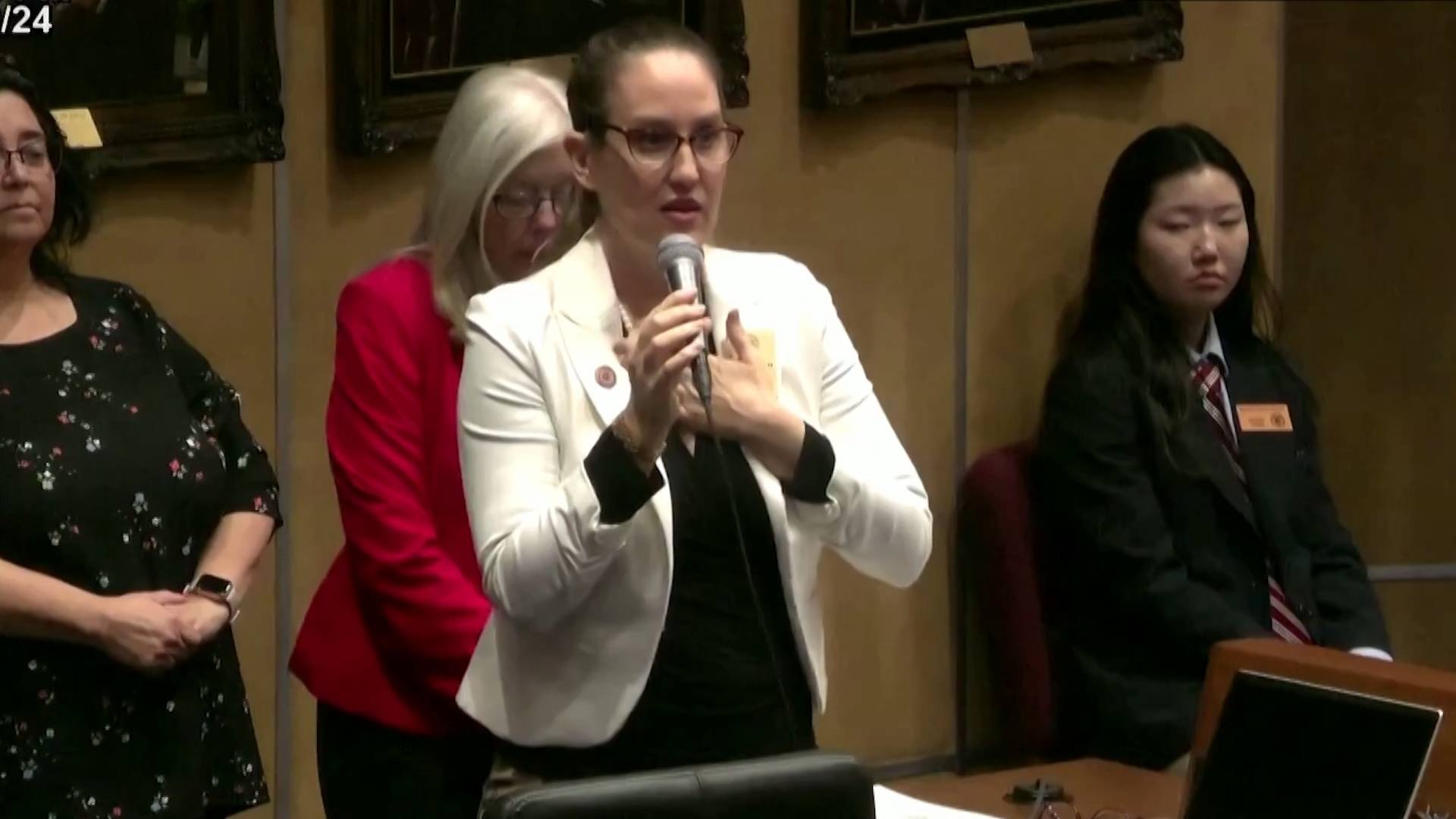This is a rush transcript. Copy may not be in its final form.
AMY GOODMAN: This is Democracy Now!, democracynow.org. I’m Amy Goodman, with Juan González.
As we continue on the issue of reproductive rights, we’re joined by Democratic Arizona state Senator Eva Burch. Last week, she made headlines when she gave a speech on the floor of the Arizona state Senate where she shared her plans to get an abortion after receiving news that her pregnancy was nonviable. State Senator Burch spoke about her struggles with fertility and miscarriage she had over a decade ago.
SEN. EVA BURCH: Two years ago, while I was campaigning for this Senate seat, I became pregnant with what we later determined was a nonviable pregnancy. It was a pregnancy that we had been trying for, and we were heartbroken over it. But now I wish I could tell you otherwise, but after numerous ultrasounds and blood draws, we have determined that my pregnancy is once again not progressing and is not viable. And once again, I have scheduled an appointment to terminate my pregnancy. I don’t think people should have to justify their abortions, but I’m choosing to talk about why I made this decision, because I want us to be able to have meaningful conversations about the reality of how the work that we do in this body impacts people in the real world.
AMY GOODMAN: That’s Arizona state Senator Eva Burch, a former nurse practitioner who worked at a women’s health clinic and has been widely critical of abortion restrictions in Arizona, where abortions are banned after 15 weeks of pregnancy, no exceptions for rape or incest. State Senator Eva Burch is joining us now from Phoenix.
We welcome you to Democracy Now! And let me start by saying you publicly announced plans last week to have an abortion. I can’t believe we’re talking about this globally. Did you have the procedure? And what was it like to have to make this public to everyone? And as you did this, Republicans walked out of the state Senate.
SEN. EVA BURCH: Good morning. Thank you for having me on the show today.
You know, I felt like it was really important for me to bring people along so that people could really see what this looks like. I’m at this critical intersection in the abortion conversation, because I’ve been healthcare provider, I’ve been a patient seeking abortion care, and now, as a lawmaker, I knew that my perspective was unique. And I wanted to share that. I wanted to pull people into the conversation so that we could be more honest about what abortion care looks like in Arizona — but this is happening all over the country — and who the abortion patient is, and really try to break through some of the stigma and some of the misunderstanding about abortion care, and hopefully move the needle in the right direction.
JUAN GONZÁLEZ: And, Senator, could you talk about how your profession as a health provider and a nurse practitioner has influenced your approach, the conversations perhaps you’ve had with other women in similar situations?
SEN. EVA BURCH: Certainly. I worked in the reproductive healthcare space for some time. I don’t work in abortion care, because that’s not something that’s available to me as a nurse practitioner, but I have had patients who were pregnant who had questions, patients who were concerned about whether or not Arizona is a hospitable environment for someone who is pregnant, patients who are unsure about whether or not continuing their pregnancy is the right decision for them. And we have to counsel them with the understanding that our laws here are in flux, that abortion care is not guaranteed in Arizona by any means, not only for patients who are just uncertain about whether or not they want to continue their pregnancy, but for patients who might be experiencing complications in their pregnancy or pregnancy loss the way that I was.
AMY GOODMAN: You spoke —
JUAN GONZÁLEZ: And could you —
AMY GOODMAN: Go ahead, Juan.
JUAN GONZÁLEZ: Can you talk about the reaction, since you made your announcement, from other members of the Senate, as well as protesters, how you and your family have coped with that?
SEN. EVA BURCH: Yes, I have had an overwhelmingly positive response. It has really been moving for me. I’ve had people sending me letters to the Legislature. I have had emails and messages and direct messages on social media to the tune of thousands. What I’m mostly receiving are people telling me their own stories or just thanking me for giving them a seat at the table. I think that people really don’t want to bring people along with them with their abortion experiences. This is highly personal, and it’s a little bit taboo, and often it’s a sensitive subject. People don’t want to talk about it, but they want to be heard. And I think people are just really grateful for this opportunity to pull people in and to have a voice, to have a seat at the table.
Now, as far as the reaction within the Legislature, I haven’t had any of my Republican colleagues reach out to me to talk about this, not in the way that maybe I would have hoped for, but I wasn’t overly optimistic about that. It wasn’t so much about trying to convince my colleagues as much as it was about trying to bring light to what’s happening in Arizona so that our constituents can make decisions for themselves and hopefully get engaged in the political process and help us to elect pro-choice candidates up and down the ticket. That’s really what we need in Arizona and in this country to make real change.
AMY GOODMAN: In one of the articles, many about you, state Senator Burch, they said you said that “I was told I could choose adoption, I was told I could choose parenting, which were two things that I couldn’t choose. It was cruel to suggest that that was an option for me, when it’s not.” If you could explain that, then also what it was like to have these Republicans walk out on you, one of them, a female state legislator, walking in, thinking you were done with your speech, then walking out for the second time?
SEN. EVA BURCH: Yes. So, I think that a lot of people don’t really understand the ways that laws can be sort of weaponized against patients, not to necessarily ban abortion, but to make abortion inaccessible or a difficult experience, to create a hostile environment in the abortion clinic, to create confusion in the patient and provider relationship. And we have a lot of that in Arizona. There is this mandatory counseling, where they have to talk about adoption and parenting as alternatives to abortion, which, of course, is not always relevant to patients, which is why it should be medical providers who are determining the appropriate counseling for their patients. They also have to talk about the probable physical and anatomical properties of the fetus at the time that your abortion will take place, which, again, certainly in my case, but in general, is inappropriate and unnecessary. And my pregnancy was not progressing. My embryo was dying and not subject to the probabilities of a normal healthy pregnancy, so that information was also just factually inaccurate for me. But that’s what the providers are required to do because of out-of-touch legislators, who don’t have any medical professional experience, who are writing the laws and dictating what doctors have to say to patients in that environment.
As far as my Republican colleagues filtering in and out and not really listening to what I had to say, I have a couple of thoughts on that. One of them is just that I think that these laws are intended to do what they did. So I don’t think that they are surprised by it or concerned about it. I think that, really, it just reinforces that what they’re doing with these laws is having the intended impacts. So I don’t think that there’s necessarily any need for my Republican colleagues to hear what I have to say, because they’re not going to make any changes or do things any differently because of that. I will also say that I have good relationships with a number of my Republican colleagues. We disagree on a lot of things. It’s really the leadership in the Arizona Senate that is so skewed far to the right. They are extremists. And they really have sort of set themselves up for failure in that way. But I didn’t experience anything that I wasn’t expecting in the chamber that day.
AMY GOODMAN: We just have 30 seconds. If you could respond to the mifepristone oral arguments in the Supreme Court?
SEN. EVA BURCH: Yes. I mean, I can’t believe we’re even talking about it, to be honest with you. I mean, mifepristone has — what is it? — 26 years of safety data and is extremely safe and effective medication. I think that we cannot be setting this precedent where we are allowing religious or extremist organizations to be able to go to highly partisan, Trump-appointed judges and bring a case all the way up to the Supreme Court. I just really hope that they do the right thing. It’s unimaginable that this is where we are with the mifepristone case. We use this medication so much more safely than so many medications that you can buy over the counter. It’s an outrageous conversation that we’re having with this. But I am hoping that the right decision will be made, but it just goes to show how serious the consequences are when we have someone like Trump who is designing a highest court in the land for the people of this country. And we have to be so conscious of that and to work so hard to make sure that we are making better decisions in November.
AMY GOODMAN: Eva Burch, Democratic Arizona state senator, nurse practitioner, announced in her speech on the state Senate floor that she planned to get an abortion last week, to call attention to the restrictions she and others now face.
When we come back, to Baltimore, where six workers who were on the Francis Scott Key Bridge when it collapsed are presumed dead, from Mexico, Guatemala, El Salvador and Honduras. Stay with us.











Post comments (0)